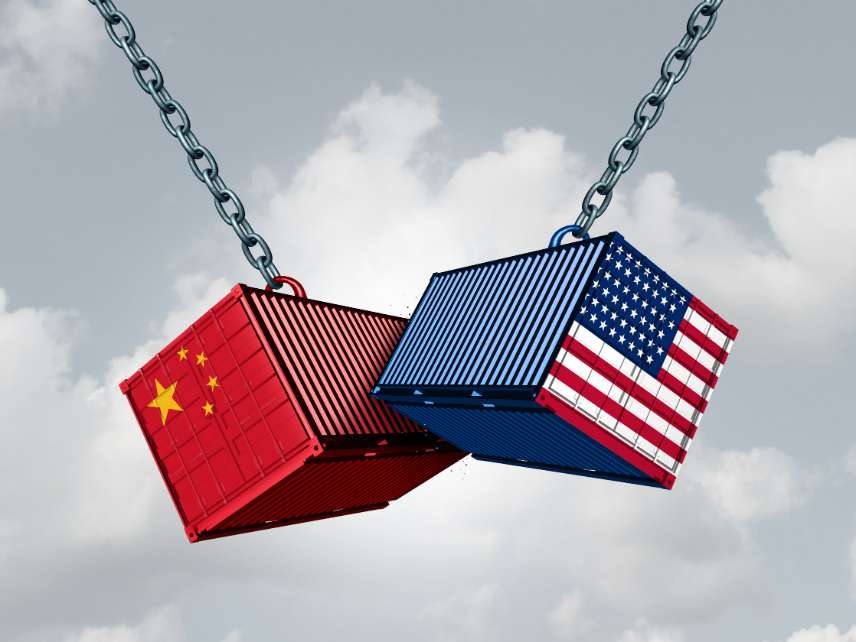Trump's Ignorant Trade War
The president should stop worrying about the trade deficit and learn to love free trade.

"We're putting the trade war on hold," Treasury Secretary Steve Mnuchin announced on Sunday. "It's about structural changes. It's about lowering tariffs. China has committed to lower tariffs on many things and made structural changes to protect our technology."
Alas, that didn't settle the issue. Several hours later, U.S. Trade Representative Robert Lighthizer reaffirmed his belief that tariffs remained an important tool to "protect our technology." Finally, on Wednesday, the president tweeted that "Our Trade Deal with China is moving along nicely, but in the end we will probably have to use a different structure in that this will be too hard to get done and to verify results after completion."
I am not sure what Trump means by "a different structure." Nor am I sure what a new framework would require. And I'm certainly not sure there's any upside to trying to make sense of all these conflicting statements.
Did the Chinese commit to the reduction of their bilateral "trade surplus" with the U.S.? Maybe. Are they committing to lowering their tariffs on American cars? Probably. Will the Chinese agree to changes in rules on foreign investment and ownership in China? Sounds like it. Will they stick to their commitments? Maybe, maybe not.
Yet one thing is sure: To the extent that China reduces its tariffs on some U.S. products and, in turn, America holds back on imposing tariffs on Chinese products, American and Chinese consumers will be the true winners of these negotiations. But not in the way many people think.
Reduced American tariffs on imports from China are great for the American people. Some Chinese exporters will also gain, but the bulk of the benefits will be reaped by consumers in the U.S. The same goes for China: The gains from reducing their tariffs on American exports will accrue overwhelmingly to Chinese consumers.
Let's suppose that the only way to truly satisfy the Trump administration's protectionists, and hence to put a permanent end to the threat of a trade war, is for China to increase purchases of U.S. goods by an annual $200 billion in order to zero out the trade deficit. This is not a far-fetched assumption, since it was the reason administration officials gave last week after the original announcement of the US-China detente.
That means they'll probably be disappointed. The Chinese government can make all the promises it wants about lowering its tariffs on American products, thus increasing demands for US goods. But those promises do not come close to assuring a reduction of the bilateral trade deficit, despite the fact that a reduction of Chinese tariffs would certainly increase Chinese purchases of U.S. goods.
Bilateral trade imbalances are meaningless because trade is global, not bilateral. That's why it's called globalization.
Suppose that there are only three countries: the U.S., China, and France. In 2018, Americans buy $1 billion of steel from the Chinese; the Chinese buy $1 billion of wine from France; and the French buy $1 billion of lumber from America. Each country's current account would be balanced—that is, it exports the same amount that it imports. But each country will still have a bilateral trade deficit with another country.
Now suppose that in 2019 China reduces some tariffs it has against exports from America. The Chinese then, in 2019, buy $500 million of lumber from America. From where, we must ask, did China get this $500 million? After all, dollars don't fall from the sky, and Chinese people have to acquire them one way or another before they can spend them.
One possibility is that China has increased the amount of steel it sold to Americans that year to $1.5 billion. In that case, the Chinese would spend $500 million on American lumber and (we may assume) the remaining $1 billion of its export earnings, as in 2018, on wine from France. The French, as in 2018, spend $1 billion buying American lumber.
In the above hypothetical example, America's bilateral trade deficit with China would remain in 2019 the same as it was in 2018—$1 billion—even though the Chinese bought more American exports.
Each country continues to have an overall current account that is technically "balanced." We Americans in 2019 do export more lumber, but we also import more steel. The additional jobs created in the U.S. by the reduction of Chinese tariffs are offset by additional jobs destroyed: More Americans work in the lumber industry and fewer in the steel industry.
Things could play out many different ways if the Chinese were in fact going to buy more U.S. exports. We can find many scenarios in which America's trade deficit with China falls on paper. Indeed, it's even possible to describe realistic scenarios in which America's trade deficit with China rises.
But it doesn't matter. Bilateral trade deficits don't have any economic relevance. The world is made of more than two countries, so it would be shocking, rather than normal, if each pair of countries has "balanced" trade. (If you still aren't convinced, you may want to read this superb piece by Bob Higgs.) It is also almost impossible to determine the particular factors that cause a bilateral trade deficit to change directions.
One last thought. While Trump and his protectionist acolytes spend a great deal of time talking about the trade deficit with China as evidence that some great corrective measures are needed, I wonder why he is silent about the many countries with which we have a trade surplus.
Does he think they should demand that we sell less to them in the name of their trade deficit with us? Does he think the U.S.'s "unfair behavior" is the result of this trade surplus in our favor? Or is this just more evidence that the president is making policy based on ignorance, ideology, and a refusal to reckon with facts?


Show Comments (47)